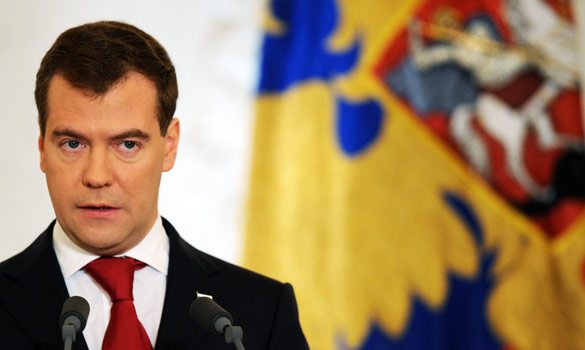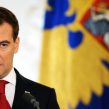
Medvedev’s Questionable Plan to Form a Government Post in Charge of the North Caucasus
Publication: Eurasia Daily Monitor Volume: 6 Issue: 215
By:

In his annual State of the Nation address to the Federal Assembly on November 12, President Dmitry Medvedev spent a whole section of his speech talking about the situation in the North Caucasus. The president admitted that the region is still a threat to peace in Russia overall. A range of measures that will hardly change the situation was suggested on the matter. The measures are exclusively of a propagandistic nature and reminiscent of the country’s communist past. He reduced the problem to the stock excuse of all analysts –corruption. According to the head of state, there is no other place in Russia where the scale of corruption and violence is comparable to what is happening in the North Caucasus. It was the first time that high level authorities acknowledged they could not change the local officialdom, which is formed on the principles of clan structures. “Frankly speaking, the level of corruption, violence, and clannishness in the North Caucasian republics is unprecedented,” said Medvedev (www.rian.ru, November 12). Confessions of such a kind clearly contradict the statements made by Vladimir Putin, who would love to see only the positive in the region (www.kp.ru, February 14, 2008).
Experiments in how to control this politically complex region have been conducted in Russia since 1991. The region was first under the leadership of a minister of ethnic affairs, then special envoys, and later presidential appointees (Sergei Shakhrai, Ivan Rybkin, Vyacheslav Mikhailov, Valery Tishkov, Ramzan Abdulatipov, and Boris Berezovsky), who had to give much prominence to Chechnya. During Vladimir Putin’s administration, the main workload was placed on the head of the Southern Federal District. Dmitry Medvedev’s attempt to introduce a new position that would be in charge exclusively of the North Caucasus –something he mentioned in his State of the Nation address– clearly demonstrates that Moscow is still looking for a solution to the North Caucasus problem. The new position is doomed because, as planned by Russia’s president, it will be an appointee of the prime minister. This means that Medvedev has made it clear at the outset that the appointee will be neither a competitor nor an opponent of the administration of Vladimir Putin. In that case, the appointee will be a mere intermediary between the head of the Southern Federal District (Dmitry Ustinov, Russia’s former prosecutor-general and minister of justice) and Moscow’s officials. Why was it necessary to introduce a new position that would be accountable to the prime minister rather than to the president of Russia? There is no logic in this whatsoever; it is a mere rollback to what was being practiced in the region in the 1990’s.
If the position is intended for Chechen President Ramzan Kadyrov, as is believed by some journalists, then it can be considered the beginning of the end of his political career. Even if the new position is raised to the level of federal vice-premier, which might be perceived as a promotion for Ramzan Kadyrov, in reality it would just be a planned removal of Kadyrov from Chechnya. Furthermore, Kadyrov occupying that position would ensure that he would be in conflict with all the heads of constituent regions of North Caucasus because of differences in management styles. He would be viewed through the prism of ethnicity (nationality), but not as the Kremlin’s protégé. It means that he would be seen as a Chechen who is trying to meddle in their business. Meanwhile, Kadyrov’s press-secretary, Alvi Kerimov, thinks that “Ramzan Kadyrov himself could have taken on the responsibilities of the position” (www.echo.msk.ru, November 12).
Kadyrov’s candidacy sits well with the president of the Russian Islamic Cultural Center, Abdul Vahed Niyazov, who believes that Kadyrov could be the first practicing Muslim to become a Russian vice-premier (www.islam.ru, November 15). It is worth noting that Russia could take full advantage of this fact, pushing for Kadyrov’s candidacy and, in so doing, presenting itself in a favorable light before the Muslim world, with whom it is trying to have some leverage against U.S. interests. One needs to remember that Ramzan Kadyrov was more popular in the Russian press in October 2009 than many Russian politicians, including such important figures as Dmitry Kozak, Anatoly Chubais, Sergei Kirienko, and others (www.ng.ru, October 30).
However, plenty of other names have been mentioned in the Russian press as possible nominees for the position of overseeing the North Caucasus region, including Dagestani millionaire Suleiman Kerimov and disgraced Ingush businessman Mikhail Gutseriev. Gutseriev is currently on the run from the Russian justice system in Great Britain. It is entirely possible that Dmitry Kozak, who has already been in charge of the Southern Federal District, will be in demand again. The candidacy of Arkady Yedelev (Russia’s Deputy Interior Minister, who was recently put in charge of the security forces of Ingushetia) also looks attractive. Some name the senator Alexander Troshin as a likely option. According to the political analyst Yulia Latynina, the position will definitely have to be filled by a North Caucasus native (Ekho Moskvy, November 12). This will hardly matter, though, if the appointee does not have the privilege to be on a hotline with both the president and prime minister of Russia, bypassing all the administration’s bureaucrats.
Ten years since the beginning of the second Chechen war in the fall of 1999, Russian authorities continue to find ways to achieve real control over the region. It is impossible for Moscow to conceal the fact that the situation in the region is worsening daily because of the spread of armed opposition by jamaats throughout the region, particularly in Ingushetia and Dagestan. The ideology of Salafism is gaining ever more popularity among the local Muslim population of North Caucasus, because it is perceived as the only counterbalance to the Kremlin’s policies in the North Caucasus represented by the local bureaucrats.




